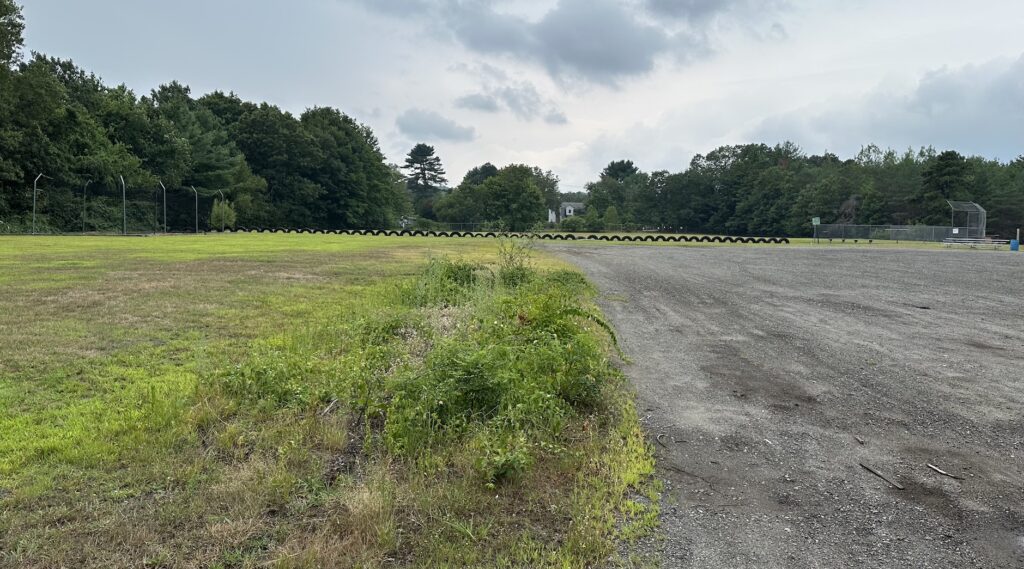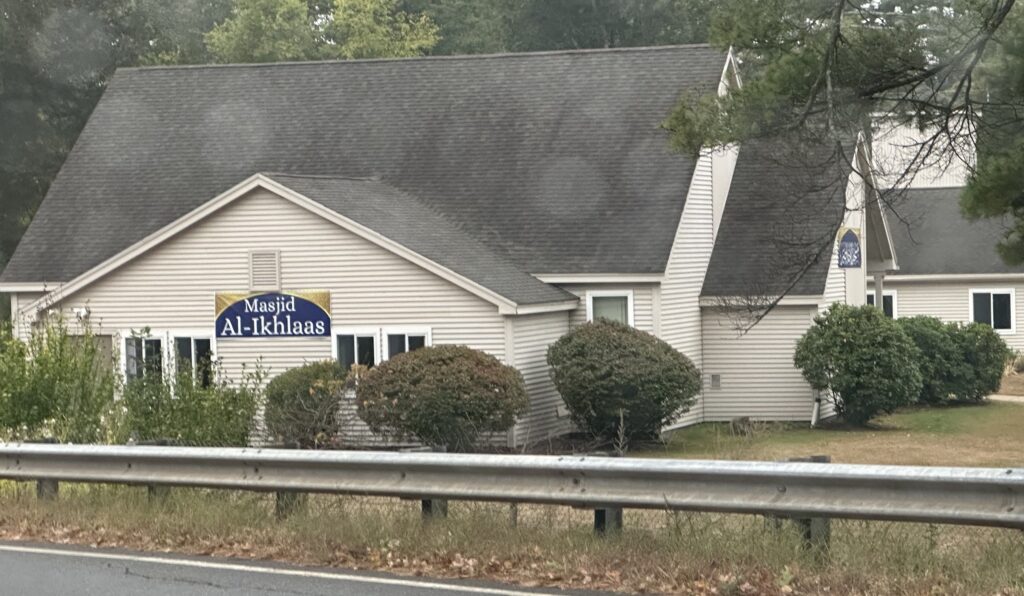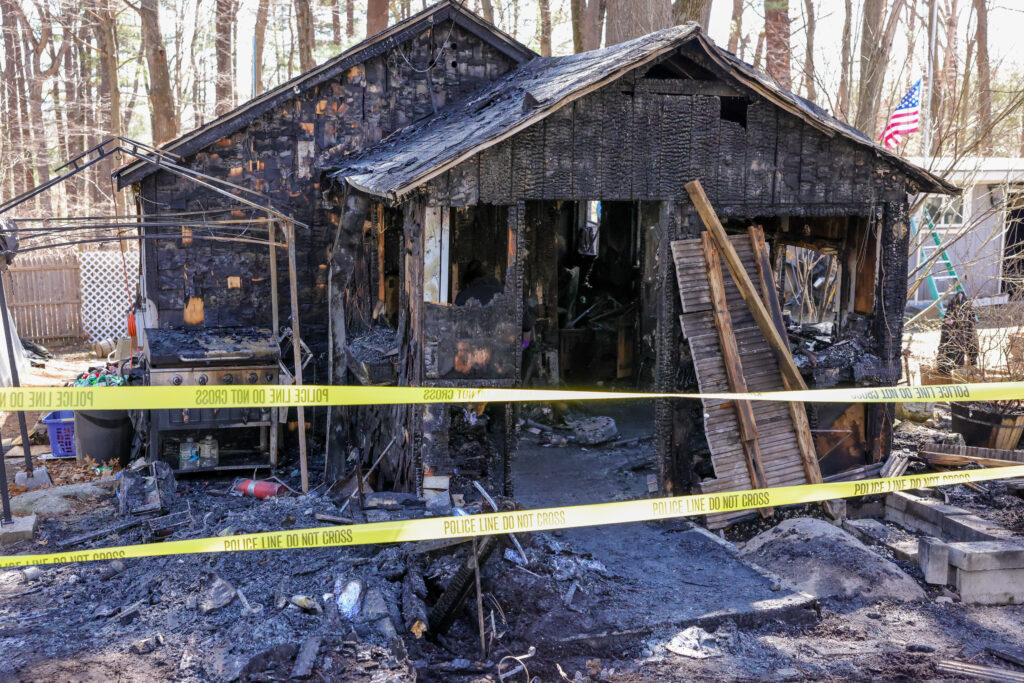The Planning Board on Monday night voted unanimously to increase the bond amount for The Trails housing development from $75,000 to $177,000 to cover the cost of repairs to Wilson Street. The Department of Public Works previously asserted that stormwater runoff from The Trails caused the road’s deterioration.
The town has had a long and complex history with The Trails and its stormwater management practices since 2021. The Conservation Commission imposed fines upon The Trails in 2023 that had been held in abeyance for nearly two years because of repeated violations. Stormwater ran off the property and impacted the Ashland reservoir as well as Wilson Street. Project engineer Peter Bemis and owner Vin Gately insisted that the damage was caused by an intense rainfall period and worked to improve the stormwater management system. The Trails sued the Conservation Commission in early 2024.
The issue of damage to Wilson Street first came before the Planning Board at its meeting on May 13, 2024. DPW Director Kerry Reed discussed the culpability of The Trails in causing roadway damage at that time.
The Planning Board scheduled a site walk of The Trails in July of last year. In December, Gately said he was not responsible for all of the damage, noting the road already was in poor condition.
Since that time, the board hoped that the DPW and representatives of The Trails would come to an amicable solution. Because they were at an impasse, the Planning Board at its Feb. 10 meeting asked the town’s engineering consultant to come up an estimate for the repairs to present to Gately.
Phil Paradis, the town’s engineering consultant, estimated the cost at $102,000, which he said was using “MassDOT prices” from the state’s Department of Transportation. He added that a contractor may be able to do the work for half the cost. The work will involve excavation, supplementation of the gravel base and installing a 300-foot berm to protect the side of the road. His estimate also included installing a 1-foot road shoulder, riprap and other safety features.
Bemis submitted a plan to Paradis shortly before the meeting that addressed these issues. Gately said Bemis’s plan “would be a $40,000 job all day long.” He suggested that the bond amount remain at $75,000 because that amount is “more than adequate to cover this work.”
At that point, chair Rob Benson expressed frustration. He said this situation should have been resolved earlier, with this meeting’s purpose to present a figure to Gately.
Gately told the board the work could be done in “about a week” during the spring and should be completed by May 15. If not, he said a discussion about raising the bond should occur then.
Principal Planner John Gelcich said the $75,000 bond was “based on work that was proposed under the approved site plan,” not for the road repair. He told Gately that he could petition the board to reduce the bond once the work is completed.
Town counsel to review Benson Road case
In another longstanding and complicated case, the board voted unanimously that town counsel should weigh in on the proposed amended definitive subdivision plan for 0 Benson Road because it affects a Planning Board decision made in 2006.
Property owner Wayne Comeau’s proposal revolves around a parcel he owns to the south of his home at 0 Benson Road. In a 2006-07 subdivision project approved by the Planning Board at that time, he had agreed to donate this parcel to the Hopkinton Area Land Trust (HALT) in exchange for an extension of a dead-end road. The land was to remain conservation land.
Comeau said previously that he had forgotten about executing the promised HALT donation for at least a decade. HALT no longer wants the land and asked Comeau to make a $1,000 donation in lieu of the land. Comeau now would like to build a home on the parcel.
Peter Brooks, a new attorney for Comeau, said the “central issue” was whether the board’s decision about the subdivision “contained a condition that a gift be made.” If that was a condition, he questioned whether the “failure to complete that gift” makes the lot in question unbuildable.
Said Brooks: “Our position quite simply is that there is no condition in that decision that required that this gift be made.”
While the proposed gift may have influenced the decision regarding the road extension, he said it was not stated as a condition of approval. Subdivision control law, he said, “prohibits a planning board from requiring a property owner to contribute their land, or some portion of their land, for some public purpose without compensating that property owner.”
Member Parker Happ suggested that town counsel review the history of this case, noting the possibility of “implied consideration” of the donation as a factor in granting waivers in 2006.
Vice chair Matthew Wronka asked how the road extension would be impacted. He said there seemed to be “a material change and a material misrepresentation” in regard to the 2006 decision. Gelcich said that while Comeau’s current home would not be impacted, “the road essentially would no longer exist.” The lot in question would not be buildable because of insufficient frontage.
Joe Antonellis, attorney for an abutter, added that the cases Brooks cited all came from situations where a planning board made the donation of land a requirement for approval. In this case, Comeau offered the land in exchange for waivers.
Because of the complexity of this case, the board voted unanimously for town counsel to review both the 2006 decision and the current request.
66 Fruit Street plan endorsed
The board unanimously endorsed a plan presented by the Town Manager Elaine Lazarus that showed that a survey of 66 Fruit Street, previously designated for future affordable housing, recently had been completed. This delineates the boundaries of the parcel, which was included the Fruit Street master plan but not previously surveyed, so that no other entity can develop that land.
Board receives BRIC grant update
The board heard a presentation from Lucy Perkins, the director of climate resilience for Siler Climate Consulting. Gelcich explained that Hopkinton was awarded a Building Resiliency Infrastructure Communities (BRIC) grant from the Federal Emergency Management Agency (FEMA) recently after applying several years ago. The firm has begun reviewing the town’s regulations and bylaws “for areas of improvement for nature-based solutions and other sustainable types of development infrastructure,” Gelcich said. Perkins noted that Siler previously worked with Hopkinton on its climate action plan.





















0 Comments